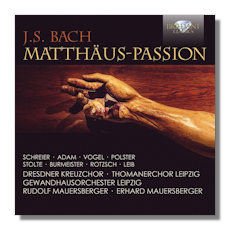
The Internet's Premier Classical Music Source
Related Links
- Bach Reviews
- Latest Reviews
- More Reviews
-
By Composer
-
Collections
DVD & Blu-ray
Books
Concert Reviews
Articles/Interviews
Software
Audio
Search Amazon
Recommended Links
Site News
 CD Review
CD Review
Johann Sebastian Bach

St. Matthew Passion, BWV 244
- Hans-Joachim Rotzsch, tenor
- Peter Schreier, tenor,
- Siegfried Vogel, bass
- Johannes Künzel, bass
- Hermann-Christian Polster, bass
- Hans-Martin Nau, bass
- Günther Leib, bass
- Erika Wustman, soprano
- Eva Hassbecker, soprano
- Adele Stolte, soprano
- Annelies Burmeister, alto
- Gerda Schriever, alto
Leipzig St. Thomas Church Choir
Dresden Boys' Choir
Leipzig Gewandhaus Orchestra/Erhard & Rudolf Mauersberger
Brilliant Classics 95109 3CDs 3:05:51
This is one of the strangest recordings of choral music I have even encountered. In my review of Riccardo Chailly conducting the Brandenburg Concertos, I scoffed at the idea of the Gewandhaus having a true Bach tradition. That was my error; I had disregarded a genuine Bach tradition in most of Germany, from the Staatskapelle to the Gewandhaus. Peter Schreier himself – he sings the role of the Evangelist here – upheld this tradition as both soloist and conductor, and this set does prove me wrong. On the other hand, it also contains some of the oddities of old-school recordings, with different soloists for the arias and recitatives. That gives us three sopranos, two altos, two tenors, and four basses. Add to that two conductors for reasons that are explained nowhere, and you have a relative oddity.
The truth is that the recording is quite good, with well-shaped and attractive choral singing throughout. The soloists are uniformly distinguished, and both conductors lead in such a way that it doesn't sound like there is more than one. This is a good thing, since neither the booklet nor even the internet are any help in figuring out who does what, when. I can't imagine this as a first choice, especially for those who demand authenticity in their Bach recordings. Still, the 1970s sound is excellent; every label save for Deutsche Grammophon was doing wonders with sound around this time. I wish I had more to write, but this really is more of a curio than a reference edition, and the lack of information as to why makes any further commentary rather moot. You'll know if you want this, friends.
Copyright © 2015, Brian Wigman





















